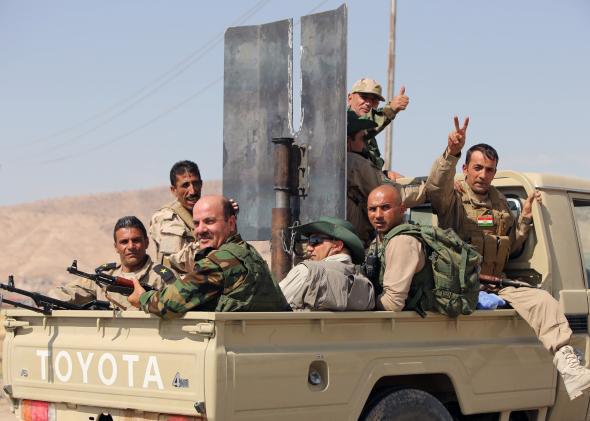About two weeks ago, with their advance into more heavily Shiite areas of southern Iraq seeming to slow, ISIS, also known as the Islamic State, shocked the world by launching its first major offensive against areas controlled by Kurdish forces, capturing several towns as well as the critical Mosul Dam and advancing toward the Kurdish capital, Erbil.
Judging by the events of the past few days, that appears to have been a serious miscalculation. What appeared to be an impending massacre of stranded Yazidi civilians combined with a direct threat to American interests in Kurdistan finally prompted the direct military intervention that the Obama administration had seemingly been doing everything possible to avoid. Kurdish and Iraqi forces now appear to have recaptured the dam—or nearly recaptured it—thanks in large part to U.S. airstrikes, and newly confident commanders are talking about an effort to recapture the city of Mosul next.
More importantly, Prime Minister Nouri al-Maliki, whose sectarian policies had created fertile ground for ISIS’ gains, has now been elbowed out, and Kurdish leaders, who had pretty transparently seen this crisis as an opportunity for greater independence a few weeks ago, now seem open to negotiating the formation of a new government. If prominent Sunni leaders can be brought into the fold, ISIS may start to lose some of the local allies who have abetted, or at least tolerated, its advance.
But it’s also important to remember that this war isn’t being fought in just one country. At the same time that its fortunes have reversed in one country, Erika Solomon of the Financial Times notes, it has been gaining in another:
Across the border in Syria, where there is no US air support, Isis has seized most of the oil-rich east and its fighters are advancing in the north, towards the country’s second city of Aleppo. Some are even massing in a southern suburb of the capital Damascus.
According to some estimates, ISIS may now control up to a third of Syria’s territory.
Over the past few months, the group has shown remarkable flexibility in both its tactics and its targets, one of its key advantages over the national governments trying to stamp it out. If its progress against Baghdad stalls, it can turn against Erbil. If it suffers a setback in Iraq, it can simply focus its efforts on Syria (or Lebanon), where the dynamics of the ground as well as the international alliances work completely differently. If U.S. airstrikes turn the tide against it on the battlefield, it can turn back to urban warfare or suicide bombings.
In other words, a group like ISIS is perfectly positioned to exploit the hazy national boundaries, sectarian divisions, and mistrust among governments in the region where it operates. Given that those factors don’t seem to be going away anytime soon, my guess is that the Islamic State will find a way to regroup. British Prime Minister David Cameron is probably right to be warning the public of a long fight to come.
